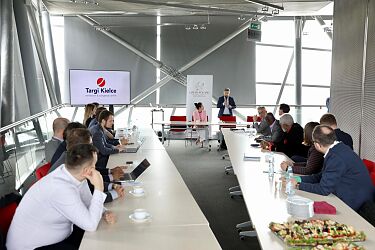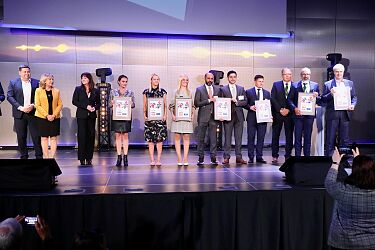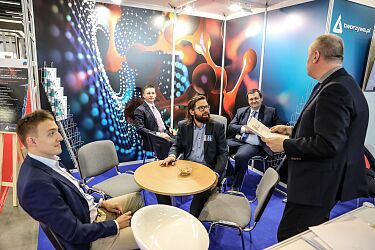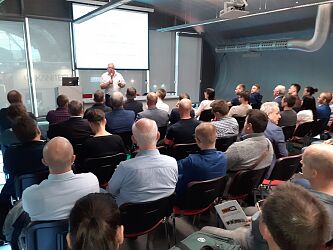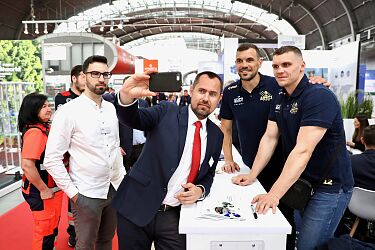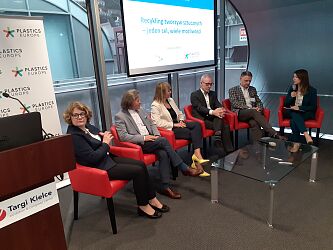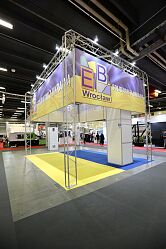News

Poland's market data - the first time the new approach includes recyclates. Target: circularity.
European statistics show that the industry is in good condition; after the COVID-19 collapse, the chemical industry's production (which includes the production of polymers), as well as the production of rubber and plastic was in the uptrend already in the third quarter of 2020, reaching the pre-crisis level at the end of 2020. In 2021, the growth continued. In the last quarter, both sectors maintained a high production level. In the rubber and plastics segment, the production in the last 3 months was much higher than in the previous ones. The plastics related industries (in the EU27), including food and drink, electrical and electronic equipment, construction and automotive, reported an increase in 2021 compared to 2020. There was an exception, however - the European automotive industry, which was hit hard by the shortage of microchips and semiconductor supplies, resulting in significant delays in car production. The most dynamic increase in production in 2021, compared to the previous year, was recorded by E&E. In Poland, at the end of 2021, all the indicated industries reached the pre-crisis level (benchmark to December 2019), while the automotive sector in our country suffered the most in the pandemic. The pandemic had the least negative impact on the construction industry, while the most spectacular increase in production in 2021 was recorded by the E&E manufacturing. This situation is confirmed by the latest available CSO data. The average increase in sold products for the plastics and rubber sector in the first quarter of 2022 was nearly 28%, slightly below the average for the entire industrial processing sector. In addition, the CSO data on employment in the industry indicate steady growth.
As recapitulated by Anna Kozera-Szałkowska, Managing Director of Plastics Europe Polska: "The new reality business is in due to the COVID-19 pandemic and the resulting supply chain disruptions has changed again with Russia's aggression in Ukraine. We can already observe the short-term consequences - they are related to, inter alia, rising fuel prices affecting the industry and destabilisation in the raw materials market. The long-term effects are hard to envisage now. In spite of uncertain conditions, the plastics industry continues to keep an eye on its key goals. They are focused on the pursuit of zero emissions and circularity. We are glad that the attempts to close the cycle of plastics, which has been observed for years, is reflected in the numbers."
This year, European data published by Plastics Europe in its report "THE CIRCULAR ECONOMY FOR PLASTICS – A European Overview" were for the first time supplemented with data for 8 key countries, including Poland. A detailed analysis of plastics circulation in 2020 in Poland, taking into account production, processing, consumption, waste management, recycling and the use of recyclates, indicates, inter alia, that the share of regranulate in the amounts processed by Polish processors is approx. 15%, with only 9.3% coming from post-consumer waste. These data are similar but slightly lower than the European averages of 16.8% and 10%, respectively. On the other hand, when comparing data on the processing and consumption of products, there are apparent differences for Poland and Europe. In Europe, the amounts processed in plants and turned into products available in the market are similar and amount to 53.9 million tons and 53.6 million tons, respectively. However, in Poland, there are clear disproportions: 4.1 million tonnes vs.3.4 million tonnes, which confirms that Poland is a net exporter of plastic products.
The press conference held within the scope of the Plastpol xpo was also an opportunity to present this year's edition of the educational project by Plastics Europe Polska "- Plastek and his magic box", organised in partnership with Basell Orlen Polyolefins LLC - a member company of Plastics Europe Polska. - Thanks to the partner, the sets of experiments targeted at pupils in grades 0-4 are distributed in schools in the Płock poviat, where the company operates. Thus, Basell Orlen Polyolefins LLC supports the education of the youngest members in its local community. More about the project and the rules for related to teachers' registration available on the website: http://www.eksperymentyplastka.pl/

